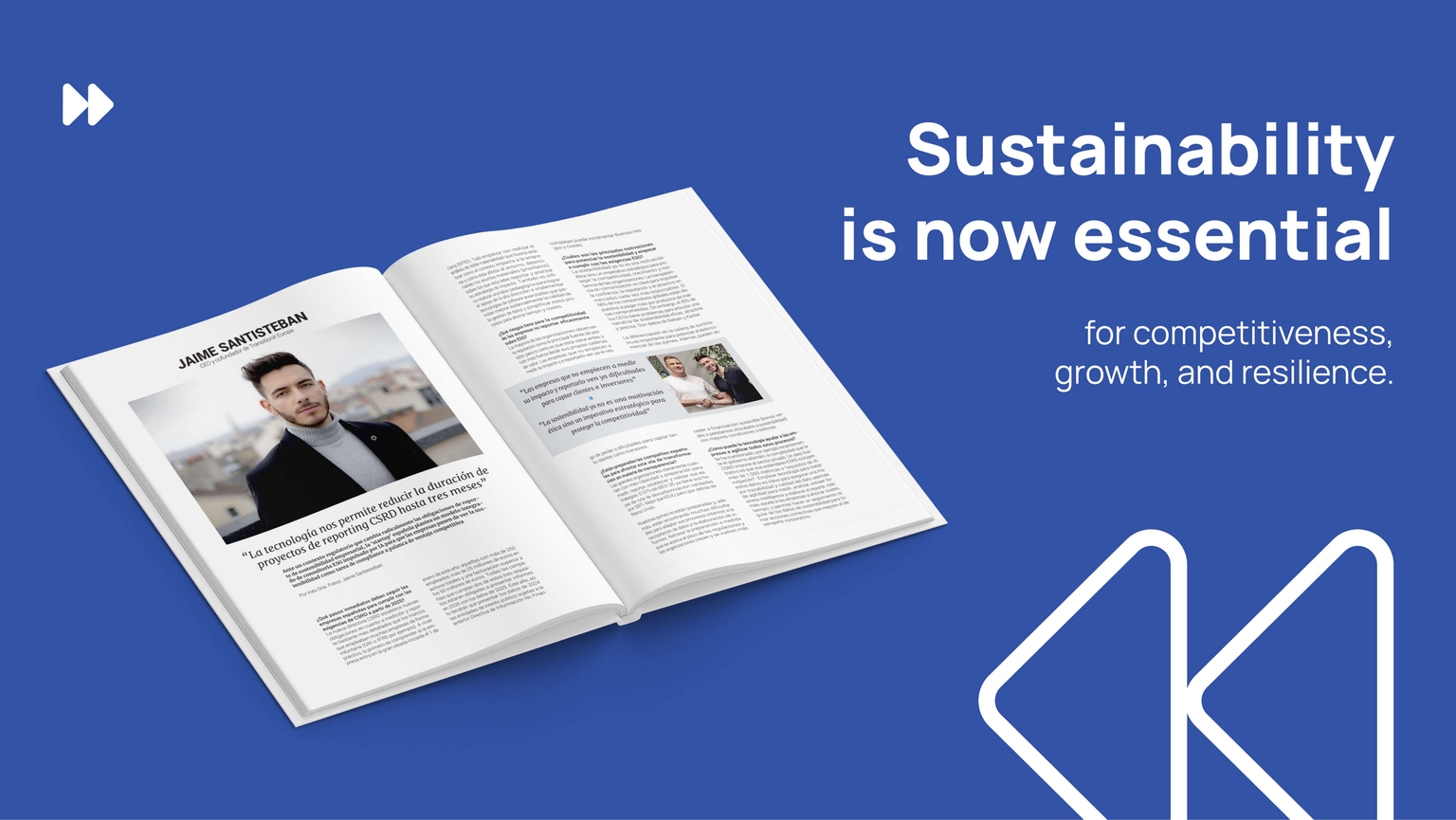- Interview with the CEO and co-founder of TransitionX Europe in ElEconomista.es
- “Sustainability is no longer an ethical motivation but a strategic imperative to protect competitiveness”
- “Companies that do not start measuring and reporting their impact are already facing difficulties in attracting customers and investors”
In a regulatory context that radically changes sustainability data reporting obligations for large companies and SMEs, the Spanish startup TransitionX Europe proposes an integrated ESG consulting model driven by artificial intelligence, enabling businesses to move from viewing sustainability as a compliance task to a lever for competitive advantage.
What immediate steps should companies take to comply with CSRD requirements starting in 2025?
The new CSRD directive introduces significantly more detailed requirements for measuring and reporting than the frameworks many companies have voluntarily used so far (such as GRI or IFRS). Practically speaking, the first step is understanding whether the company falls under the large wave of entities affected as of January 1 of this year: those with more than 250 employees, over 25 million euros in total assets, and revenue exceeding 50 million euros. Companies meeting two out of these three criteria will be required to present reports in 2026 covering data from 2025. This year, only public-interest entities subject to the previous Non-Financial Reporting Directive (NFRD) will need to present data for 2024.
It all starts with conducting a double materiality assessment, which analyzes how the external context impacts the company and how the company affects its surroundings, determining the material (priority) topics on which it must report and focus its impact strategy. It is also critical to carry out educational efforts to secure top management support and implement advanced software technologies to significantly improve data management quality and simplify these processes, saving time and costs.
What risks do companies face if they fail to report effectively on ESG?
Most organizations perceive regulation as the primary source of pressure, but in reality, it comes first—and more strongly—from their own value chains. Companies that do not begin measuring and reporting their impact are already facing the risk of losing customers and investors or struggling to attract them.
Are Spanish companies prepared to face this wave of transformation in transparency?
Large organizations clearly have more capacity and readiness to measure, report, establish, and validate their strategies. About 57% of IBEX 35 companies already have their decarbonization roadmaps validated by SBTi. This is better than the U.S. but lags behind the UK.
Our SMEs, however, are not prepared and are encountering many difficulties in adapting their internal processes to data collection and report preparation. Delaying preparation as deadlines approach and as organizations grow and become more complex can increase risks and costs significantly.
What are the main motivations for enhancing sustainability and complying with ESG requirements?
Sustainability is no longer an ethical motivation but a strategic imperative to protect competitiveness, growth, and resilience. Transparency in communication is key to boosting trust, reputation, and appeal in increasingly responsible markets.
Globally, 66% of consumers are willing to pay more for products from committed brands. However, 42% of CEOs report difficulty in articulating an effective, compelling, and accurate sustainability narrative, according to Nielsen and Kantar data. Supply chain differentiation is crucial for boosting SME commercial success. Additionally, they can access sustainable financing (green bonds or sustainability-linked loans) under better credit conditions.
How can technology help companies streamline all these processes?
The complexity imposed by CSRD on the private sector has been questioned, for example, by the German government. An illustrative fact is that its ESRS standards include over 1,000 metrics or “disclosure requirements”. Using technology to manage this data is key to ensuring greater traceability and data quality, as well as agility in measuring, analyzing, extracting business intelligence, and preparing reports. Moreover, it helps companies save costs and time, and allows for regular monitoring of sustainability data to take corrective actions that improve corporate performance.
Our technology covers carbon footprint measurement, double materiality assessment, and CSRD reporting, developed by Baltic software engineers and awarded the 2024 Platinum Pele for innovation. Through AI functionalities, it can detect those 1,000+ ESG metrics in any internal document, improve the final audit process, and draft report content. Companies using our technology report saving between one and three months on their projects with this tool.
While measuring and reporting initiate a transparency process, the key lies in communicating progress and pursuing bold, strategic actions by designing robust policies aimed at driving deep changes.
How can companies prepare for the two new regulations on greenwashing?
Both the Green Claims Directive and the Empowering Consumers for the Green Transition Directive aim to promote more accurate, data-based, and tangible communication, free from vague or exaggerated claims. These regulations require that claims be pre-approved by independent verifiers and prohibit those based solely on carbon credits.
The deadline for transposition is March 2027, but other regulations are already in force. The Unfair Competition Law and the General Advertising Law, which have been in place for over 20 years, prohibit certain unfair practices. In fact, the recent lawsuit by Iberdrola against Repsol was based on these laws. Additionally, various ISO certifications (e.g., 14001, 14064) are useful for communicating with rigor and building trust.
Scope 3 emissions represent up to 90% of the carbon footprint in some industries, but their measurement and management remain a challenge for sustainability teams. What strategies should companies adopt to manage and reduce them appropriately?
Scope 3 emissions represent up to 90% of the carbon footprint in some industries, but their measurement and management remain a significant challenge. These emissions are generated throughout the value chain and do not come from the company’s direct activities but from suppliers, distributors, and customers. According to CDP, industries such as financial services, electrical machinery, or electronic manufacturing top the list, as they depend on complex supply chains and external factors.
They generate controversy and difficulties for companies, as they cannot directly assume responsibility for third-party emissions, and precise measurement involves an additional burden. Strong opposition and even legal threats forced the SEC (U.S.) to abandon its regulatory ambitions in this area in 2022. Often, getting partners to measure and communicate is an odyssey. Again, technology is a key tool, allowing for automated data collection and analysis, with increasingly demanded support from specialized consulting firms.
What solutions do TransitionX Europe and Mitigate offer their clients, and how does it differ from traditional ESG consulting and software firms?
The solutions currently offered to organizations are not effectively addressing their needs: ESG software companies often fail to provide the active and expert support that businesses demand, while most consulting firms still rely on outdated Excel spreadsheets or limited software for data management and ESG reporting. In my view, internal inefficiencies (insufficient resources and teams) and external ones (consulting without a technological base) are the main reasons why companies today invest 43% more in reporting (talking) than in innovating and developing their sustainability agendas (doing), according to IBM data.
Our startup combines integrated ESG consulting services and AI-driven technology to optimize the quality and agility of reporting projects (CSRD, Double Materiality Analysis, carbon footprint calculation), execute sustainability plans, and communicate commitments and achievements through a strong, responsible, and inspiring narrative validated by legal experts on anti-greenwashing regulations.
The goal is to help companies stop seeing sustainability as a regulatory burden and instead view it as a growth lever and competitive advantage. We want organizations to focus on their core business, energy transition, and positive impact.
What is your client profile, and what are the company’s short- and medium-term plans?
Across Europe, it is estimated that more than 50,000 companies will be required to comply with CSRD. As I mentioned, however, the pressure to measure and publish transparently is also coming from suppliers, clients, banks, and investors. Listed SMEs in Europe will be required to present their sustainability reports in just two years, and we are already receiving interest from companies eager to start preparing.
We serve small, medium, and large enterprises across all sectors, although certain industries are a priority for us due to their significant environmental impacts and the various regulations they face. The profiles we work with are also diverse, extending beyond sustainability teams to include finance and communication leaders who are increasingly involved in ESG.
Many companies active in sustainability are turning to so-called greenhushing. What is this phenomenon, and how can TransitionX Europe help to reverse it?
Greenhushing refers to a growing trend among companies to avoid communicating their sustainability practices in order to evade scrutiny that they find uncomfortable.
Our recommendation to counter this trend is to start developing a data measurement system to mitigate or eliminate risks, as well as to design transparent and honest communication strategies that showcase sustainability efforts with a tangible, data-driven foundation. We also collaborate with marketing and communication agencies to train their teams in this area.
Which companies with an impact could serve as inspiration in such a complex context?
The decarbonization of technologies that form the backbone of the new digital economy and society (software, AI, cloud computing, IoT) is one of the greatest challenges of our time. In this context, I believe that SNGULAR is positioning itself as a leading firm by demonstrating a strong commitment to digital sustainability, focusing on improving the impact of these innovations.
The company has implemented internal initiatives to achieve net zero emissions and, through its strategic collaboration with Google Cloud, is driving the sustainable modernization of businesses in Spain and Portugal.

